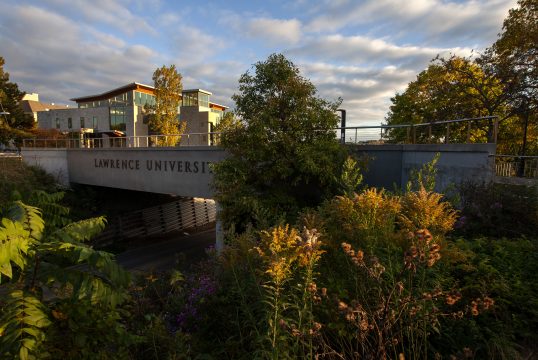
In the afternoon of Thursday, May 2, Lawrence hosted the inaugural New North Environmental, Social and Governance (ESG) summit in Warch Campus Center. The event brought together business representatives from all over Wisconsin to discuss ESG-related issues and the benefits of prioritizing sustainability in business, as well as foster university connections to the organizations. Its launch was the result of a collaborative effort between New North Inc. and the Wisconsin Sustainable Business Council (WSBC), and it was brought to campus by Sustainable Lawrence.
At 1 p.m., the event commenced with a brief introduction from the organizers and a discussion of why prioritizing sustainability practices is beneficial to businesses. Managing Director of the Wisconsin Sustainable Business Council Jessy Servi Ortiz talked about the importance of incorporating sustainability into the fabric of any business and how to determine a starting point for adopting sustainability practices. She laid out the business incentives for following ESG-related principles and presented the topics of the summit as a means of moving from “random acts of environmentalism” towards strategic approaches to practicing sustainability.
This was followed by a panel discussion of how Wisconsin companies are incorporating ESG-facing values into their business models. The panel consisted of representatives from U.S. Venture, Plexus, Faith Technologies Inc. and Menominee Tribal Enterprises.
The following panel discussion presented attendees with the opportunity to evaluate the ESG practices of their own businesses. Finally, the event broke off into roundtable discussions regarding specific issues, such as sustainability and student engagement, and ended with an open networking opportunity for attendees. The summit’s emphasis on networking reflected WSBC’s collaborative approach to addressing sustainability in business.
“The way that we think about sustainability is really holistic in that all things are connected,” said Ortiz. “The same is true in business, and so integration is important because it’s not just somebody’s job. If it just becomes somebody else’s job, then nobody takes responsibility for it. What we really look for is for it to be everyone’s responsibility.”
President of Menominee Tribal Enterprises Michael Skenadore asserted that student involvement in corporate sustainability efforts is not only beneficial in terms of forming career connections, but also in fostering the collaborative effort to address these issues.
“I think student engagement is the key to not only building your own corporate workforce, but I think it’s key to building a community that has some experiences that can influence the way they think about sustainability,” Skenadore said.
Ortiz conveyed that business’ commitment to sustainability is essential to their futures in the eyes of young people.
“I think the younger generation wants to work for a company that’s walking their talk, that’s doing good in the world,” Ortiz said. “They want purpose, and connections, and to feel like they are getting mentorship, and to feel like they are contributing to something positive. So that’s a culture shift for a lot of industries in Wisconsin who might not be used to that desire from their workforce.”
